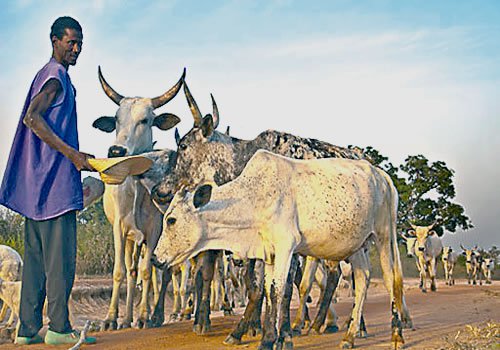
LAST Monday, the Ekiti State governor, Mr Ayodele Fayose, signed the “Prohibition of Cattle and Other Ruminants Grazing in Ekiti, 2016” bill recently passed by the state House of Assembly into law. Speaking during the occasion, Speaker of the assembly, Pastor Kolawole Oluwawole, explained that the assembly gave the bill accelerated hearing in order to maintain peace and order in the state. Giving an overview of the law, he said: “Anyone caught grazing on portions of land or any farmland not allotted by government shall be apprehended and made to face the law.
Any herdsman caught with firearms and any weapons whatsoever during grazing shall be charged with terrorism. Any cattle confiscated shall be taken to government cattle ranch at Erifun and Iworoko Ekiti community in the state. Any farm crop destroyed by the activities of any apprehended herdsman shall be estimated by agricultural officers and the expenses of the estimate shall be borne by the culprit. Any herdsman who violates any of these rules shall be imprisoned for six months without option of fine.” On his own part, Governor Fayose enthused: “With the signing into law of this bill today, anyone caught grazing with arms or any weapon in Ekiti would now be charged with terrorism and be made to face the law according to certain sections of it. The same goes for those who graze in prohibited areas or go against the time frame of 7 a.m. to 6 p.m. allowed for open grazing.”
Not surprisingly, a group calling itself the Jamu Nate Fulbe Association of Nigeria and comprising herdsmen from Ilorin, Kwara State, but who are resident in Ekiti State, condemned the new law, saying the restriction of grazing activities to between 7 a.m. to 6 p.m. on a daily basis and the prohibition of weapons handling were not in its interest. It did not however state why its interest should override that of the government and people of Ekiti State. Neither did it state the law which empowers its members to wield assault weapons while supposedly protecting their cattle.
In many significant ways, the impunity of the herdsmen has been fuelled by the reluctance of the Federal Government to tackle them. Pictures of cattle parading the streets of the Federal Capital Territory or impeding the right of way on the Abuja-Kaduna rail track have become a regular feature of life. Indeed, Fulani herdsmen have now invaded the National Stadium, Abuja, constantly wielding assault weapons and overwhelming the stadium’s security officials. The stadium manager, Sati Mbok, said this week that the management had been making frantic efforts to stop the herdsmen, but they had continued to invade the stadium in droves. This is despite the prohibition, by the FCT administration, of free grazing by Fulani herdsmen in the nation’s capital. Which modern society runs in this lawless manner? The sad and dangerous impression given is that Nigeria is now another Animal Farm where some animals are ethnically more equal than others.
Indeed, given the horrendous activities of the herdsmen who have acquired global notoriety by being tagged the fourth deadliest terror group in the world, the Ekiti grazing law could not have come at a better time. In civilized climes, cattle farming is recognised and treated strictly as a business, not as a vehicle for plundering other people’s property and committing genocide. It does not pose any security threat, as it is done in government-approved ranches and without any intent to undermine national security. In other words, it is strictly agricultural. In Nigeria, however, as we have stressed in previous editorials on the menace of herdsmen, cattle grazing has become only a cover for blatant terrorism, with the herdsmen undermining the benevolence of their hosts and committing murder, rape, arson and brigandage. At various times this year, the herdsmen reportedly killed and raped women in various states; they hacked down entire villages in cold blood, and committed robbery on the highways. Deaths arising from attacks by herdsmen in Benue State alone are estimated at 1,269 persons.
What is more, experience has in fact shown that cattle tended in ranches fare significantly better than those subjected to constant movement by herdsmen. It is therefore in the interest of Nigeria’s herdsmen to embrace the ranching system. But they have proved time and again that they are not ready for a change from the nomadic system. It is in this connection that the intervention by the Ekiti State government is most timely and expedient. It is an indication of a government which is responsive to its people’s yearnings and mindful of its constitutional mandate of securing the lives and property of the citizenry. Through the grazing law, the Ekiti State government has set the pace and toed the path which we hope other states will follow irrespective of political affiliation. Modern societies are not run with moral suasion; they are run with policy frameworks and law and order, ensuring that the animalistic tendencies to which humanity is easily prone are kept in check, for the betterment of society. Nigeria should be no exception.
END

Be the first to comment